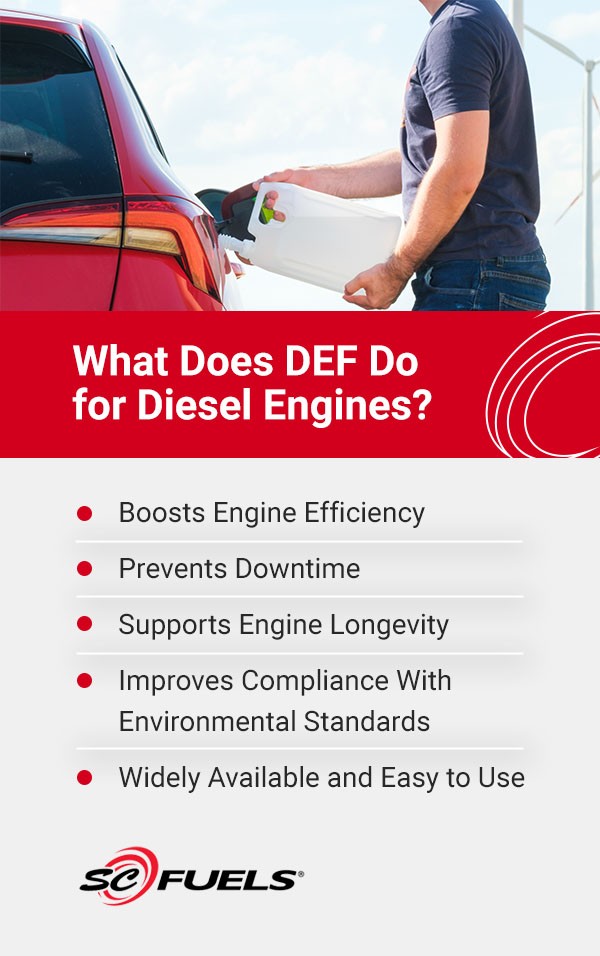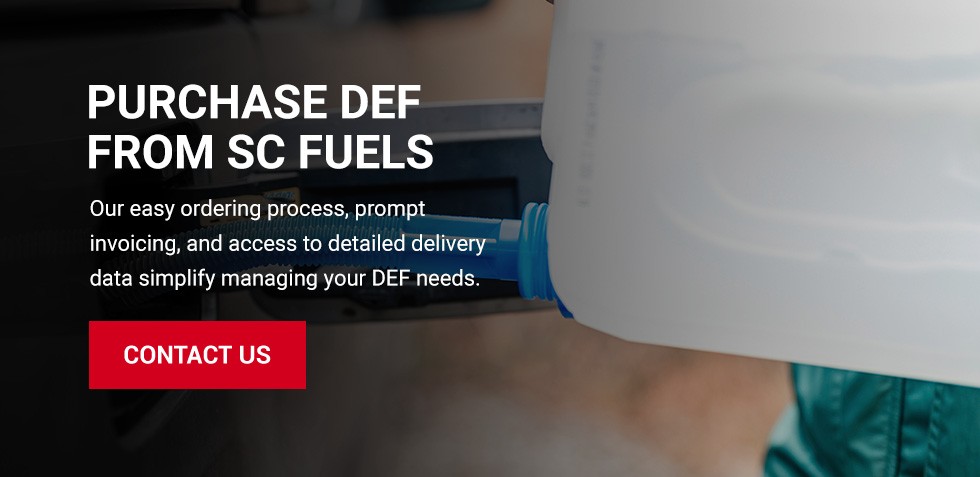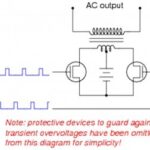Diesel Exhaust Fluid (DEF) is a crucial component in modern diesel engines, working to reduce harmful emissions. This article from WHAT.EDU.VN explores what DEF is, its composition, and how it benefits diesel engines. We’ll also cover common questions and concerns surrounding DEF, like its expiration and where to purchase it. Understanding DEF will help you maintain your vehicle’s performance and environmental compliance. The guide explains the environmental standards, emission control technology and fuel consumption.
1. Understanding DEF: What is Diesel Exhaust Fluid?
Diesel Exhaust Fluid (DEF) is a non-toxic liquid solution used in diesel engines equipped with Selective Catalytic Reduction (SCR) systems to reduce nitrogen oxide (NOx) emissions. These emissions are harmful pollutants that contribute to air pollution. DEF is a critical component in meeting environmental regulations and maintaining engine efficiency.
1.1. The Role of Selective Catalytic Reduction (SCR)
SCR is an advanced emission control technology integrated into the exhaust system of diesel vehicles. It works in conjunction with DEF to convert NOx into harmless substances. Here’s how the process unfolds:
- DEF Injection: As exhaust gases leave the engine, DEF is injected into the exhaust stream.
- Chemical Reaction: The DEF reacts with NOx, breaking it down into ammonia.
- Conversion to Harmless Substances: The ammonia further reacts with NOx gases in the SCR catalyst, transforming them into nitrogen and water vapor.
- Release: Nitrogen and water vapor are then released into the atmosphere.
1.2. Why is Diesel Exhaust Fluid Important?
DEF plays a vital role in reducing the environmental impact of diesel engines. Specifically, it reduces smog formation and minimizing the harmful effects of acid rain. By converting harmful NOx gases into nitrogen and water vapor, DEF promotes cleaner and more efficient operation of modern diesel vehicles. This fluid is essential for maintaining air quality and public health.
2. The Composition of DEF: What is it Made Of?
Diesel Exhaust Fluid is a carefully balanced solution consisting of two key ingredients: 32.5% urea and 67.5% deionized water. This specific formulation ensures optimal performance within the SCR system and helps diesel engines meet stringent environmental regulations.
2.1. Urea: The Active Ingredient
Urea is the active component in DEF responsible for the chemical reaction that neutralizes NOx emissions. However, it’s crucial to note that the urea used in DEF is not the same as the natural urea found in animal waste. Instead, it’s a synthetically produced, high-purity compound specifically manufactured for industrial applications. This industrial-grade urea is free from contaminants that could harm the engine’s exhaust system.
2.2. Deionized Water: The Carrier
Deionized water acts as the carrier for the urea, allowing the solution to flow smoothly through the engine’s exhaust system and facilitate the SCR process. The use of deionized water is critical because regular water contains minerals and impurities that can damage the SCR system components. Deionized water ensures the stability of the solution and prevents clogging or corrosion within the exhaust system.
3. The Benefits of DEF: What Does it Do for Diesel Engines?
DEF offers numerous benefits for diesel engines, including enhanced efficiency, reduced downtime, and improved environmental compliance. By working in tandem with SCR technology, DEF helps diesel vehicles operate cleaner, more reliably, and within regulatory standards.
3.1. Boosting Engine Efficiency
Before the widespread adoption of SCR systems and DEF, emissions control methods often compromised engine performance. Techniques such as exhaust gas recirculation required engines to operate at lower combustion temperatures, which reduced fuel efficiency and power output. DEF allows diesel engines to operate at optimal combustion temperatures.
- Better Fuel Economy: Optimum combustion temperatures lead to more complete fuel combustion, resulting in improved fuel efficiency.
- Increased Power Output: Engines can deliver maximum performance without sacrificing emissions standards.
3.2. Preventing Downtime
Downtime can be a significant cost for fleet owners and operators. DEF helps minimize downtime by ensuring that vehicles with SCR systems remain operational. When DEF levels are low, the system alerts the driver to refill before performance is affected or the engine shuts down completely. These alerts enable drivers to maintain a steady supply of DEF, reducing the risk of disruptions.
3.3. Supporting Engine Longevity
Diesel engines are known for their durability and long life spans, and the addition of SCR systems and DEF can further extend their potential. DEF contributes to engine longevity through several mechanisms:
- Reduced Soot and Carbon Deposits: DEF promotes more efficient fuel combustion, which reduces the buildup of soot and carbon deposits inside the engine. This leads to cleaner components and reduced wear and tear.
- Lower Exhaust Temperatures: The SCR system reduces the workload on other emissions-control components, resulting in lower exhaust temperatures and less stress on the system.
- Minimized Risk of Damage: The high purity of DEF helps prevent contaminants from entering the exhaust system, protecting sensitive components.
3.4. Improving Compliance with Environmental Standards
Governments worldwide have implemented strict emission standards to reduce air pollution. DEF provides a practical solution for meeting these regulations. Noncompliance can lead to substantial fines and loss of operating permits for fleet operators. By using DEF, fleet owners and operators can ensure they remain compliant and contribute to long-term sustainability.
3.5. Wide Availability and Ease of Use
DEF is readily available at most fuel stations and automotive supply stores. Fleet operators can further streamline the process by using bulk DEF delivery services, ensuring a consistent supply and reducing the burden of inventory management. DEF’s standardized formula ensures compatibility with most modern diesel engines. The tanks are designed for easy refilling, with clear indicators and user-friendly nozzles to prevent spills.
4. The History of DEF: When Was it Required?
The Environmental Protection Agency (EPA) introduced DEF in 2010 to address and reduce harmful emissions from diesel engines. The EPA and other regulatory bodies established stricter standards for NOx emissions and particulate matter from heavy-duty trucks and diesel-powered vehicles. These regulations were phased in, requiring newer trucks (manufactured after 2010) to comply with the new limits.
These standards aimed to curb the contribution of diesel engines to air pollution and improve air quality, public health, and the environment. As part of the new emissions standards, manufacturers adopted SCR technology, which relies on DEF to reduce NOx emissions. While 2010 marked the official introduction of DEF requirements in the U.S., its use has since expanded internationally. Many other countries have adopted similar emissions standards for heavy-duty diesel vehicles.
5. Understanding the System: How Does a DEF System Work?
The DEF system works through a combination of technology and chemistry. To fully understand how it operates, it’s helpful to examine the main components and their respective roles in reducing emissions:
- DEF Tank: Stores the DEF, often with temperature control to prevent degradation.
- DEF Pump and Injector: The pump draws DEF from the tank and sends it to the injector, which delivers the precise amount of DEF into the exhaust stream.
- SCR Catalyst: A chamber where chemical reactions occur, breaking down NOx gases.
- Control System: Monitors DEF levels and regulates the entire system.
As diesel fuel burns in the engine, it produces exhaust gases. Before these gases exit through the tailpipe, DEF is injected into the exhaust stream. The DEF interacts with the heat in the exhaust system and decomposes into ammonia and carbon dioxide.
The ammonia then reacts with NOx gases within the SCR catalyst. This reaction breaks down the NOx molecules into nitrogen and water vapor. After the SCR process, the system releases these neutralized gases into the environment. By the time the exhaust exits the tailpipe, DEF has neutralized most of the harmful emissions.
The amount of DEF injected depends on several factors:
- Engine Load: Heavier loads require more power, which leads to higher NOx emissions and a greater need for DEF.
- Exhaust Flow Rate: Faster exhaust flow during high-speed operations necessitates quicker DEF injection.
- Operating Conditions: Temperature can affect the DEF system’s function. DEF freezes at 12 degrees Fahrenheit (-11 degrees Celsius). DEF tanks incorporate heating elements that thaw the fluid as the engine warms up.
If DEF levels drop too low, the engine control system will alert the driver via dashboard warnings. Modern diesel engines can enter “limp mode” or “derate mode” to limit power and speed and prevent excessive emissions.
5.1. Managing the DEF System
SCR and DEF are effective at offsetting harmful emissions, but they can present operational challenges:
- Freezing: Even with heaters, freezing can delay operations if precautions aren’t taken.
- Contamination: DEF is vulnerable to impurities, which can compromise its effectiveness and damage the SCR system.
- Storage and Shelf Life: DEF has a shelf life of one to two years if stored correctly. However, exposure to high temperatures, direct sunlight, or contaminated storage containers can reduce its effectiveness.
The following practices can help maximize DEF’s efficacy:
- Invest in Proper Storage: Use dedicated storage tanks or containers to prevent contamination. Keep storage areas cool, shaded, and clean to maintain the fluid’s integrity. Regularly inspect large tanks for leaks, contamination, or signs of aging.
- Monitor and Maintain DEF Levels: Check the dashboard frequently to track DEF levels and alert drivers before tanks run low.
- Train Drivers and Technicians: Educate drivers and technicians on reading DEF gauges and responding to low-level warnings. Emphasize the potential issues that can arise when using contaminated DEF or substituting it with other liquids.
- Winterize the Fleet: For fleets operating in colder climates, ensure that all vehicles have functional DEF heating systems. Store the liquid indoors or in insulated tanks to protect it from extreme temperatures during transit or refilling.
- Source High-Quality DEF: Partner with reliable suppliers for consistent access to high-quality DEF that meets ISO 22241 standards. Avoid buying from unverified sources to reduce the risk of substandard products.
6. Frequently Asked Questions About DEF
Here are answers to some of the most common questions about DEF:
| Question | Answer |
|---|---|
| What is Blue DEF? | Blue DEF is a branding name used in Germany. DEF is a colorless liquid, despite the name. The term “Blue” typically indicates its association with the German Association of the Automotive Industry (VDA). |
| How often should you add DEF? | You should add DEF approximately every 5,000 miles, depending on your vehicle’s fuel consumption and DEF tank size. |
| Can you use water for DEF? | No, water cannot be substituted for DEF. DEF contains deionized water and urea, which is crucial for the chemical reaction that neutralizes NOx emissions. Using water can damage the SCR system and void the engine’s warranty. |
| What is a substitute for DEF fluid? | There are no suitable substitutes for DEF. DEF is a specific mixture of urea and deionized water, and it is the only fluid that can trigger a chemical reaction in the system. Using a different liquid can damage the engine and SCR components. |
| What happens when you run out of DEF? | When the DEF tank is empty, the vehicle’s SCR system cannot reduce NOx emissions, and the engine may experience a power reduction. Your engine may be prevented from starting until you refill the fluid. |
| Does DEF expire? | DEF does expire. Under proper storage conditions, DEF can last up to two years if unopened and stored at ideal temperatures or one year if opened. Always check the expiration date on the container and avoid using expired or contaminated DEF to prevent system issues. |
| Where can I buy DEF? | DEF is available at SC Fuels. We provide businesses with high-quality DEF and bulk delivery services. Our team can help you understand your operation’s DEF needs and be your trustworthy fuel partner. You can also find DEF at most fuel stations and automotive supply stores. |


7. Still Have Questions? Ask WHAT.EDU.VN!
We understand that navigating the world of diesel engines and DEF can be complex. If you still have unanswered questions, don’t hesitate to ask!
At WHAT.EDU.VN, we provide a free platform where you can ask any question and receive prompt, accurate answers from knowledgeable experts. Whether you’re curious about DEF, engine maintenance, or any other topic, we’re here to help.
7.1. Why Choose WHAT.EDU.VN?
- Free and Easy: Asking questions on our platform is completely free and incredibly easy.
- Fast Answers: Get the answers you need quickly.
- Expert Advice: Connect with knowledgeable individuals who can provide reliable information.
- Community Support: Join a community of learners and experts who are passionate about sharing knowledge.
7.2. How to Ask Your Question
- Visit WHAT.EDU.VN.
- Type your question into the search bar.
- Submit your question and wait for our experts to provide a helpful answer.
We’re committed to providing a valuable resource for anyone seeking answers and information. Don’t hesitate to reach out and let us help you!
8. Purchase DEF from SC Fuels
SC Fuels offers reliable fuel solutions for fleet operations, diesel vehicle owners, and gas station owners. Whether you are managing a large fleet or a growing business, we are here to simplify the process with reliable bulk delivery, competitive pricing, and exceptional service.
We provide DEF across the West Coast and Southwest regions. Our easy ordering process, prompt invoicing, and access to detailed delivery data simplify managing your DEF needs. With access to your account, you can track your orders and monitor costs.
9. Need More Information? Contact Us!
If you need assistance with your DEF questions, please contact us immediately.
Address: 888 Question City Plaza, Seattle, WA 98101, United States
Whatsapp: +1 (206) 555-7890
Website: WHAT.EDU.VN
Don’t wait any longer. Ask your questions on what.edu.vn today and get the answers you need, absolutely free!

